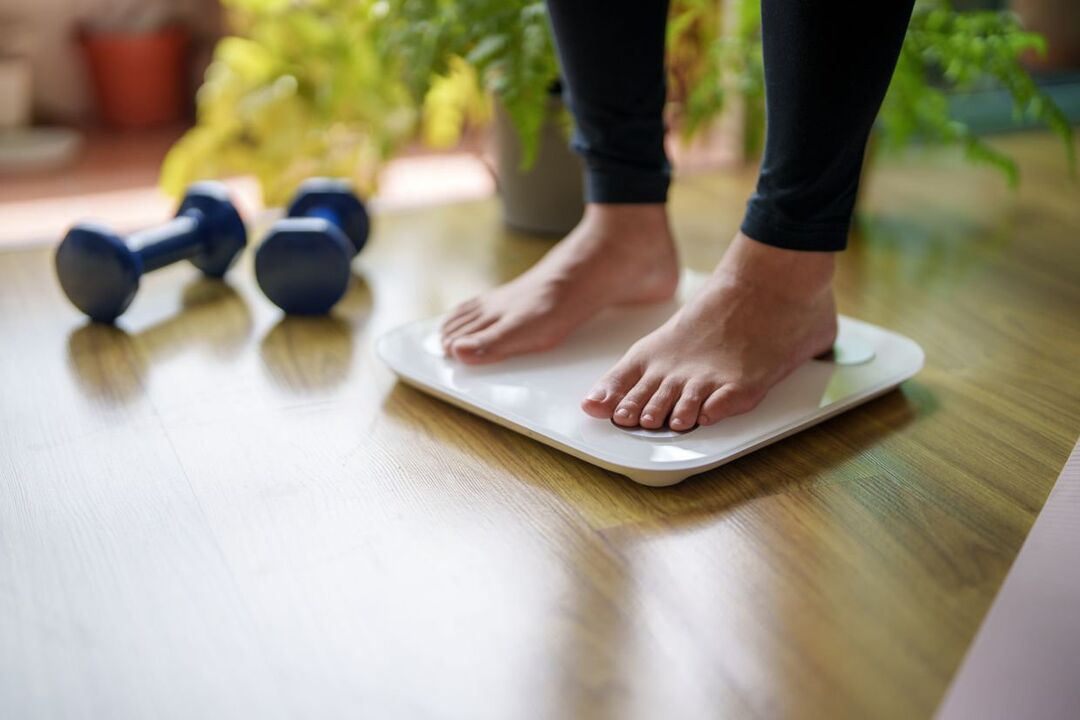
These suggestions can also prevent you from gaining weight.
Too much weight can not only affect appearance, but also life. Excessive weight can lead to cardiovascular complications, type 2 diabetes, musculoskeletal system problems and mental illness.
- Obesity is one of the basic risk criteria for the development of endometrial cancer (internal mucosa of the uterus).
- Among women surviving menopause, the extra pound is associated with high likelihood of breast cancer as well as colorectal cancer.
- Excessive weight is one of the causes of development of esophageal and renal cancer or pancreatic adenocarcinoma, especially in men.
- In the context of non-alcoholic fat diseases, obesity can lead to cancer in the organ and tumors in the gallbladder.
- The same study correlates obesity with the development of multiple myeloma (hypertransmission of plasma cells).
It is important to note that the link between overweight and cancer is complex and multifactorial. Mechanisms that obesity contributes to the emergence of oncology include fluctuations in hormone background, chronic inflammation, insulin resistance, and other factors. Given all the risks listed, you need not only to be fashionable, but also to extend your life.
"Weight loss is a complex and prolonged process that requires not only a person's food habits and lifestyle changes, but also a major effort of will and psychological stability. Motivation here may vary. For some, it is a desire to have a more attractive appearance and increase self-respect, so that certain social standards constitute a loss in every aspect or loss in every aspect.
What we will talk about:
Factors that affect the motivation for weight loss
Both men and women are interested in losing weight. The difference is that in girls, this desire is often due to the need to adhere to recognized beauty standards, while in men - a health condition.
- According to the WHO, about 18-year-olds are overweight, with more than 650 million of them suffering from obesity.
- Staying motivated during weight loss is a key factor in success.
- According to various estimates, between 80% and 95% of people trying to lose weight eventually recovered from their previous weight in the year.

So we talked about the subject of factors. They are divided into external and internal motivations.
External incentives
They proceed from the outside and can be associated with our appearance, social environment, recognition and other aspects of our lives.
- Improve the appearance.It is one of the most common external incentives for weight loss. People usually want to look more attractive, harmonious and healthy. This may be due to the desire to like in the mirror, wear the clothes you like, and be more confident and attractive in the eyes of others.
- Social recognition.It also plays an important role in the motivation for weight loss. People often want to get recognition and support from social environments - family, friends, colleagues.
- Comply with social standards.People often feel pressure from society, media and social networks that promote idealized images of slim people. This is the motivation to start eating and class in the lobby.
- Professional requirements.Models, actors, athletes and other publics must comply with certain character standards. In this case, professional requirements can become a powerful external incentive for weight loss.
Although external incentives play an important role in the motivation for weight loss, internal motivation is still based on personal values and beliefs, which is more effective and stable.
Internal motivation for weight loss
This breed provides a person with the necessary willpower and perseverance to overcome difficulties and achieve goals. What can encourage a person to lose weight?
- Improve health.Weight and over-obesity are risk factors for the development of many serious diseases. Losing weight even a few kilograms can significantly improve health, reduce the risk of these diseases and extend lifespan.
- Improve quality of life.Excessive weight can limit physical activity, cause fatigue and discomfort, and lead to the development of psychological problems such as depression and anxiety. Weight loss can improve quality of life, increase energy, improve sleep, and increase self-esteem.
- Improve the well.After throwing away the excess weight, a person gets rid of various unpleasant symptoms such as shortness of breath, sweating, joint pain and back.
- Improve self-esteem.A complete person often feels unattractive, embarrassed by his own body, and can avoid communicating with others. Losing weight can help increase self-esteem, gain confidence and start treating your body with love and respect.
- Achieve personal goals.For some people, weight loss is related to achieving certain personal goals, such as having the opportunity to wear clothes you like, engaging in a exercise, or feeling more comfortable inside.

It is important to note that internal motivation is personal and unique to everyone. When setting goals for weight loss, it is necessary to consider your personal values, needs and desires to choose the most effective motivation and help achieve the desired results.
Psychological aspect of motivation
Internal and external motivations are key elements in determining a person’s ability to adhere to the weight loss process and achieve goals. However, weight is always easier to "eat" than to work for a long time. So you need to set your goals correctly and create a reward system.
- Set goals.They should be clumsy, concrete and achievable (I will tell you in more detail in the article). For example, it is best to set a goal of "losing 5 kg of weight in two months".
- Set priority.What do you want to get: How many cakes tonight or on a scale of tomorrow morning - 500 grams? Goals and priorities can be ignored. Many people use motivation cards for this - they hang in a visible place, which is a photo of a beautiful character.
- Develop an action plan.It should include specific steps that must be taken to achieve goals such as dietary changes, increasing exercise activities and adjusting lifestyles.

It is important to note that action plans should be realistic and take into account a person's personal characteristics, his lifestyle, habits and preferences.
Research published in the journal shows that people who set their own specific goals to lose weight on average increased by 20% compared to those who did not. The support of loved ones increases the chances of successful weight loss by 30%.
Overcome obstacles and support in the process of change
When setting goals and plans, remember that during weight loss you will encounter various obstacles such as hunger, fatigue, stress, social stress, and more. It is important to prepare for these obstacles and develop strategies to overcome them.
hunger
- To maintain a stable glucose level in the blood and prevent hunger, it is recommended to eat food every three to four hours every three to four hours.
- When choosing foods, you should prefer foods rich in protein, fiber and complex carbohydrates. These include vegetables, fruits, whole grain products, low-fat meats and fish.
- Sometimes, hunger can be caused by insufficient fluid in the body. To maintain hydration, you need to drink enough water during the day.
- Don't skip food, as this can lead to a strong sense of hunger and result in overeating.

fatigue
- In order to fully restore the body and sufficient energy charge, it is necessary to have at least seven to eight hours a day.
- Regular physical exercise, even moderate, can help improve sleep quality and improve energy levels.
- Avoid stress as they can lead to fatigue and emotional burnout. Techniques to determine relaxation and disassembly voltages, such as yoga, meditation or walking in fresh air.
- Provide your body with the necessary vitamins and minerals to maintain energy.
pressure
- Determine what exactly causes your stress and try to remove these factors, or find effective ways to deal with them.
- Practice relaxation techniques regularly, such as deep breathing, meditation or yoga.
- Don't forget to allocate time to bring you a hobby, which brings you fun and helps you get distracted.
- If you can’t cope with the stress yourself, it is recommended to seek help from a qualified psychologist or psychotherapist.

Social pressure
- Share your plan to lose weight with friends and family so they can support you.
- Feel free to reject snacks that don't match your power plan.
- Communicate with people who also strive to seek a healthy lifestyle and weight loss.
- Learn not to say no to those who are trying to get you to eat harmful food.
To avoid breaking, write down your diet to control your diet and identify the problem. Don't try to lose weight too quickly, either. Install the achievable goals and move gradually towards them.
Types of motivation during weight loss
We have pointed out that there are external and internal motivations. Now, we will analyze the pros and cons of each species.
External motivation
It is based on the desire to gain recognition from others, meet social standards, or achieve certain external goals, such as "wearing your favorite clothes" or "looking attractive on the beach".
advantage:
- Starting to lose weight can be a good urge.
- When the result is not visible yet, it can maintain momentum in the initial stage.

shortcoming:
- Unstable, which may disappear quickly if external pressure is weakened or the goal is achieved;
- If the weight loss process is slow or does not match expectations, it can lead to disappointment and collapse.
- It can lead to dependence on other people's opinions and lead to the loss of one's own personality.
External motivations are effective in the initial stages, but are usually not sufficient to achieve long-term results. Therefore, it is best for those who want to lose a few kilograms.
Internal motivation
It is based on realizing the need to change lifestyles to improve health, well-being and general quality of life.
advantage:
- It is stable and persistent throughout the weight loss process;
- Helps overcome difficulties rather than giving up when obstacles arise;
- It helps to form healthy habits and lifestyles that are preserved after achieving their goals.
shortcoming:
- It takes time and consciousness to form;
- In the case where there is no visible result in the initial stage, it can be difficult to maintain.

This motivation is a bigger factor in weight loss success, not externally. People with high motivation will lose more weight and retain longer results than those with external motivation. In addition, internal motivation and people who seek weight loss are more satisfied with their lives and mental health.
Practical ways to maintain power
The establishment of smart fibers
Smart goals are an effective tool that helps make the weight loss process more structured and achieved. The abbreviation intelligent decoding is as follows.
- Specific (specific) - This goal should be clearly formulated and does not contain vague formulas. One example above is not "loss weight", but "lossing weight by 5 kg".
- Measurable (measurable) - This goal should have a specific criterion by which its achievement can be evaluated (reducing weight by 5 kg in two months).
- Achievable (Achievable) - The goal should be realistic and match your capabilities. Don’t "lose 30 kg of weight in one month", but "lose 2 kg of weight per month and 24 kg of weight per year". It is important to consider the characteristics of the body here. There are some diseases that cause obesity. To lose weight, you need to be diagnosed and get rid of the disease until then - diet.
- Related (Related) - The goal must correspond to your values and needs. If you lose weight to become "like this model", your motivation will quickly evaporate.
- Time Limit (Time Limit) - The goal should have a specific achievement time. This helps focus on the task rather than delaying later implementation.

To be specific to weight loss, determine your ultimate goal. How many kilograms do you want to reset? for how long? Always divide a big goal into several small goals. Therefore, it's easier for you to track progress and stay motivated. Set specific terms to achieve each small goal. Write down your clever percentile on paper or electronic form, review your goals regularly, and adjust if necessary.
Create an atmosphere of support
The weight loss process is often associated with difficulties and challenges, which are not easy to overcome. With the help of friends, family and professional coaches, this supportive atmosphere plays a key role in achieving long-term results and maintaining a healthy lifestyle motivation.
In 2007, the results of the study were published, indicating that obesity can be "infected" and spread on social networks. However, the same effect can work in the opposite direction: support and motivation from friends and family can help lose weight.
This family is one of the most important sources of support for those who work hard to lose weight. Importantly, relative support is not only emotional, but also practical. For example, you can cook healthy food together, plan joint walks or exercises, and help avoid situations that cause segmentation.
Friends can also be a source of motivation, inspiration and support. Comrades who share your goals will be excellent partners in training that will help deal with stress and share tips on healthy lifestyles.

Professional trainers have the necessary knowledge and experience to consider your functions and goals to develop personal training and nutrition plans. It will help to perform exercises correctly, select the best load, and motivate and support you throughout the process to achieve the desired results.
To engage others in the weight loss process, share your plans to reduce weight on social networks and friends. Explain what you need and ask loved ones to support you. Join the group or communicate with other weight loss on the forum - so you will support each other.
Keep your diet and training diary
Keeping a diary is not only a fashion trend. Its effectiveness is not only confirmed by a large number of studies. This is enough to fix everything you eat and drink during the day and indicate the type and duration of physical exercise.

For convenience, you can use special applications to automatically calculate the ratio of protein, fat, and carbohydrates in your diet.
Maintaining your diet and training brings many advantages, where you can emphasize:
- Awareness of diet: Recording helps to see which products prevail in the diet and determine "hidden" calories.
- Control Calorie Content: Diary allows you to accurately calculate the number of calories you consume and control compliance with goals of weight loss or maintaining weight.
- Analysis of food habits: Recording helps identify bad habits in nutrition, such as overeating, using lots of sweet or fat, and taking steps to change them.
- Monitoring of physical exercise: The diary allows you to track the progress of physical activity, plan training and control its effectiveness.
- Motivation and Responsibility: Maintaining a diary will increase awareness and responsibility for nutrition and physical exercise, which will help achieve its goals.

For maximum efficiency, the following rules are recommended:
- Write down everything you eat and drink, including the smallest snacks and drinks.
- Indicates the exact amount of food consumed (weight, volume).
- Describe how to cook.
- Repair eating time.
- Write down the type, duration and intensity of the sports activity.
- Analyze your notes, identify patterns and draw conclusions.

The motivation to lose weight is not something that is coming. This is not a will or self-discipline, but the result of a consistent, consistent step that eventually becomes a habit.

































